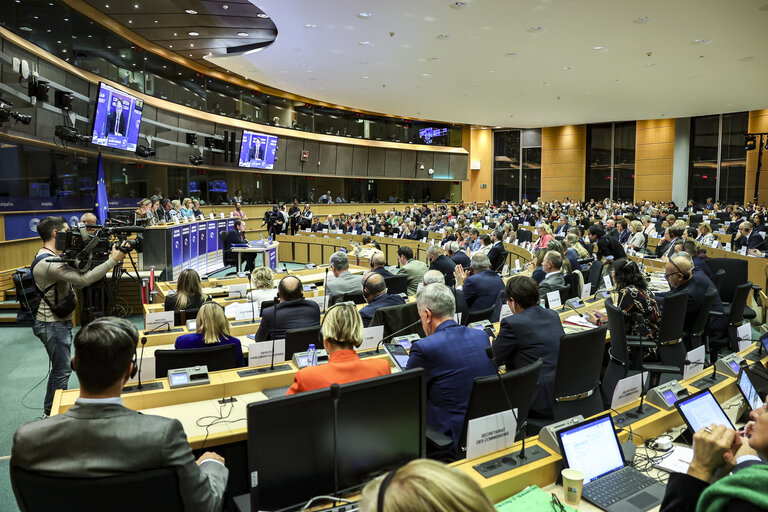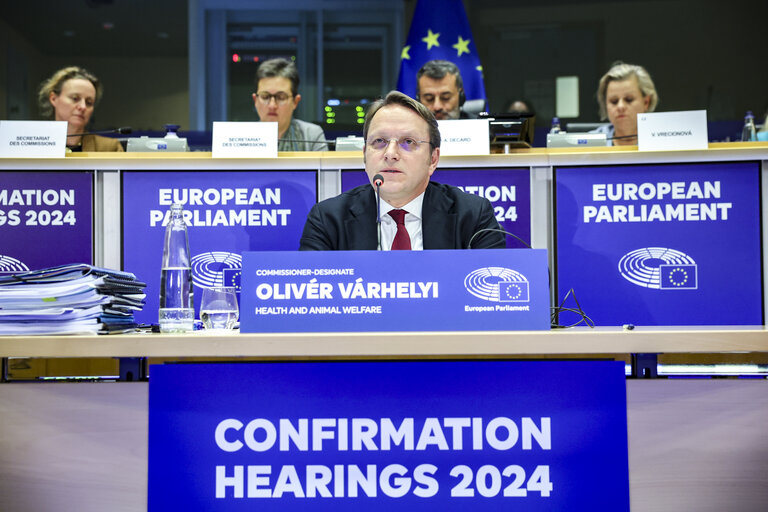The Commissioner-Designate for Health and Animal Welfare, Olivér Várhelyi, was questioned by the European Parliament on Wednesday evening after having passed the test on conflict of interests.
The hearings started on 4 November and will continue until 12 November. Beforehand, all Commissioners-Designate replied to written questions prepared by the different parliamentary committees. They have also filled in a declaration of potential or actual conflict on interests. This procedure is confidential and a precondition for a candidate to take part in the hearings.
From the very start, Várhelyi, a Hungarian lawyer, civil servant and diplomat, showed that he had done his homework and studied the topics and policy issues in his new portfolio. As current Commissioner for Neighborhood and Enlargement he is considered to have delivered. Born in Szeged, the third largest city in Hungary, he mentioned two Nobel Prize winners in medicine from its university.
Health care and medicines
This seemed to motivate him to meet the expectations as new Commissioner for Health, with an emphasis on prevention. He was familiar with on-going legislative work in the health sector aiming at strengthening healthcare systems, ensuring access to and affordability of care and medical products in the EU and stimulating EU research and competiveness in the pharmaceutical sector.
Following the lessons learned from the COVID-19 pandemic, he was also well aware of the need for coordination of EU health policy and proactive Commission measures, such a joint procurement of medicines. The only medicines that he will consider to be safe for European citizens are those that have been authorized by the European Medicines Agency (EMA).
During the pandemic, Hungary chose to buy the Sputnik vaccine from Russia. Asked about it, Varhelyi replied that it fell under the competency of member states but stressed that only medicines approved by EMA can be considered to be safe. As a civil servant and Commissioner his task is t0 serve the common interest of the EU.
Better mental health
He is committed to initiate new health measures in the framework of the European Health Union, similar to Europe’s Beating Cancer Plan, to combat other common and serious diseases. He was less informative about mental health in the hearing but drew attention to it in his written response.
Varhelyi wrote that he, if confirmed by the Parliament, would also continue the work on mental health. “Already before the COVID-19 pandemic, mental health problems affected around one in six people in the EU at a cost of EUR 600 billion, or more than 4% of our GDP. In 2021, one in five adolescents had a mental health condition.”
The parliament has recognised that better mental health is both a social and an economic imperative. He intends to take forward the measures set out in the 2023 Communication on a comprehensive approach to mental health. The implementation of the 20 flagships set out is either in progress or already completed, but EUs need to continue working with Member States and stakeholders.
Vague on animal welfare

The hearing at the Parliament, credit: EP
As regards the second leg of his portfolio, he disappointed the animal welfare organisations who had campaigned for a dedicated animal welfare Commissioner. Asked how he would act to the growing citizen demands for higher animal welfare standards, he replied that he will modernise the rules on animal welfare standards building on EU’s existing legislation.
“I will do this in line with the latest science, taking account of sustainability, ethical, scientific and economic considerations, as well as concerns around the competitiveness of European farmers and citizens’ expectations. I firmly believe that the competitiveness of EU farming needs to be maintained. Our future legislation must reflect this objective.” But he recognized the need to ban caging of farmed animals.
“Cages are becoming obsolete,” he said at the hearing, and added some caveats. “Phasing out animal cages with appropriate species-specific transition periods will require a targeted legislative approach and accompanying measures that support stakeholders in making this transition in a sustainable and economically viable way, safeguarding the competitiveness of Europe’s farmers.”
According to animal welfare NGO ‘Compassion in World Farming’, all the necessary consultations and impact assessments have already been conducted. The Commission-initiated Strategic Dialogue on the future of agriculture is the most recent example of that – calling for a ban on cages and a review of the EU’s animal welfare legislation by 2026.
Pressed at the hearing about the missing proposals to reform the EU’s outdated animal welfare legislation, Varhelyi confirmed that he aims to finalise the proposal on live animal transports as soon as possible. However, he did not commit to delivering the pending files on the keeping and slaughter of farmed animals. Instead, he said that he will insist on enforcing the current legislation.
That is also a challenge as the current painful stunning methods used in slaughter in EU Member States have been allowed for years because of economic reasons. According to Eurogroup for Animals, pigs across the EU are killed after gas stunning (C02) which is both ineffective and causes intense suffering. Most broilers are stunned using electric water baths which also are ineffective and causes suffering.
The full Commission needs to be elected by a simple majority of the votes cast in plenary. The vote is currently scheduled to take place during the (25-28) November session in Strasbourg.

